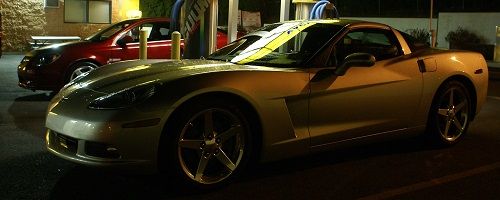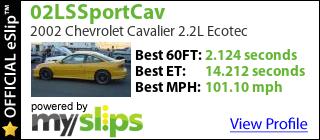So Ive been pondering lately what the best way to go about tuning a car. As most people know there are alot of ways to make power with out detonation.
You can drop timing, keep thorwing fuel, run an alternitve cooler (water meth alky) or you can be a BALLA and just run race gas all day. but what Im trying to figure out is the happy medium to the whole thing. when does droping your timing start burning valves? is there a limit to to much fuel? is there any real problem with just droping massive amounts of meth?
And whats more does any of it correlate to a specific intake charge temp and power level. For instance does a car making 300 HP with 170 degree temps need only a few degrees of timing pulled and an intercooler, and only a 12:1 AFR?
or how about my freind
he runs a talon, on a 14b with a 16g wheel, he has a nice size front mount, slightly retarded timing, and know meth. he runs 93 at the pump, but heres the kicker under boost burys the wideband at 10:1. the damn thing never moves. and apperntly its the only way he can keep it from knocking out. and yes the car runs good.
so what are your thoughts, and your setups. (specific numbers please)
"
boobs now with Riboflabin"

in terms of real-world scenarios, you need to do testing in order to answer most if not all of your questions.
there's a few rules of thumb, but without actual data to dissect, its hard to solve anything. Assumptions and tuning do not go well hand in hand.
another common mistake is people live and die by the wideband gauge... sensors go bad, they go out of calibration, etc etc.
does he have EGT data as well? If its just knock he's worried about, there's some other problem.. fuel pump too small? fuel pressure too low? injectors too small? overboosting too much on a small turbo can do it as well... once you keep increasing boost beyond a turbo's efficiency island, you just heat the air up and don't make anymore power. Also a big intercooler isn't neccessarily thermally efficient, it could be time for a larger one, or one with a thicker core, or a bar and plate design.
There's too many variables to narrow down without a really good street tune or just dropping the cash on a dyno tune, and the answer to most of your questions lies with your car strapped to a dyno.
Other people's numbers may help, but even from car to car it will differ greatly.
Jcavi wrote:And whats more does any of it correlate to a specific intake charge temp and power level. For instance does a car making 300 HP with 170 degree temps need only a few degrees of timing pulled and an intercooler, and only a 12:1 AFR?
170* is very high IATs for any car and to me is unacceptable.
This sounds like either a s/c or a non-intercooled turbo. 12:1 is a fine AFR so long as you don't get any sudden changes or spikes in boost where the fueling can't keep up.. this is why most people run 11 to 11.5:1 on the street with pump gas (also since pump gas tends to suck and lower octane ratings, extra fuel adds as somewhat of a cooling agent to help further prevent detonation). Racing fuel is a little safer at those leaner AFRs
IATs don't really have much to do with power, just a good indication of where knock is coming from. Anything much over 110* is kind of bad. Some cars can't avoid it, especially on hot days but once cruising IATs should avg the outside temperature if not slightly lower. I know in the skwirl at idle it would get pretty high.. around 106* I think was the average.. but cruising, when nice fresh air was making its way into the engine bay through hood creases, coming up through the bottom of the bay, etc, temps would usually hover around 80*
An intercooled turbo car should have lower IATs than an all-motor car on average because they're intercooled. Sitting at idle there may be little if any difference, but when the turbo car is in boost, IATs should be slightly lower than an all motor car (assuming the intercooler is efficient and sized correctly).

Are you sure about the IAT's ?
I thought 150 to one 170 was an average temp for a forced induction car.
as for my specific example, he noted something that actually made me post this whole thing. I knew that the average tuner would drop timing to try and keep knock down, and thus alowing more boost. but what I didnt know was that if you start to lower it to much, you end up spikeing EGT's to a crazy high temps which will inturn burn up a valve. and thus he's tuning cars that what to run crazy high boost on pump without any meth, by just trhowing fuel and lowering the EGT's
now what Im trying to figure out is why pulling timing to much would rasie EGT's Im pretty sure hes wrong there. the thing would fall on its face, but I dont think its gonna rasie EGT's lower if anything. as for the fueling, I know for a fact that there are guys masking there low octane high boost and stock timing with the motto of just thorwing fuel at it. Im assuming this works, becuase the massive fuel acts as a cooler and lower's the temps which reduces knock..
the more I discuss and think about it the more a chem cooler seems like a good idea. I used to think it was a band aid. but know im not so sure its a bad one. I mean if the alternitve meathod of cooling temps is directly proportianl to looseing HP (I.E. drop timing..loose power, massive fuel.....Loose power, drop boost..... really though) then why not use a meth kit.
I dont know what do you guys think
"
boobs now with Riboflabin"

just read the EGT post good read
"
boobs now with Riboflabin"

Quote:
now what Im trying to figure out is why pulling timing to much would rasie EGT's Im pretty sure hes wrong there. the thing would fall on its face, but I dont think its gonna rasie EGT's lower if anything. as for the fueling, I know for a fact that there are guys masking there low octane high boost and stock timing with the motto of just thorwing fuel at it. Im assuming this works, becuase the massive fuel acts as a cooler and lower's the temps which reduces knock..
Its pretty simple actually...
When you advance timing, you start the ignition before TDC on the piston, so lets say you have an engine that goes through all the cycles in 360 degrees (its actually 720, but lets say for simplicities sake)....
In an advanced timing setup, 0 degrees being 0 advance, you advance your timing 13 degrees...
Ignition happens at 13 degrees BTDC, the mixture burns until the engine opens the exhaust valves at 180 ATDC, that gives you a 193 degree rotation before the still burning exhaust gasses get shot out of the engine.
In a retarded timing setup, 0 degrees being 0 retard, you retard your timing 13 degrees...
Ignition happens 13 degrees ATDC, the mixture burns until the engine opens the exhaust valves at 180 ATDC, that gives a 167 degree rotation before the still burning exhaust gasses are shot out.
Since advancing the timing allows for a more complete burn, and therefore more use of the available power in the amount of fuel and air (oxygen) shot into the combustion chamber, the resulting gasses that leave the combustion chamber on the exhaust stroke are cooler. Retarding the timing too much and you are going to spit out the still burning gasses therefore raising the EGT's.
This also explains why too much timing will actually degrade performance (aside from going so far as to cause mechanical damage). You should only advance the timing so far as to get the burning exhaust gasses out of the camber after a complete burn. Advancing too far is just leaving completely used up exhaust gasses in the chamber. That is unless you advance it so far that you damage the piston and/or rod by trying to rotate the engine in the opposite direction...
 4cyltuner.com
4cyltuner.com - Information Source For 4 Cylinder Tuners
Buy stuff from CarCustoms Ebay! Won't be disappointed!
Jcavi wrote:
as for my specific example, he noted something that actually made me post this whole thing. I knew that the average tuner would drop timing to try and keep knock down, and thus alowing more boost. but what I didnt know was that if you start to lower it to much, you end up spikeing EGT's to a crazy high temps which will inturn burn up a valve. and thus he's tuning cars that what to run crazy high boost on pump without any meth, by just trhowing fuel and lowering the EGT's
I think your friend needs to rethink his methods. Yes, running a lower AFR helps cool cylinder temps, but if he is running much lower than 11:1 AFR's on pump gas, then there is no way he is atomizing most of the fuel. Liquid fuel does not burn, which means it will collect on the cylinder walls and lead to premature damage to the rings.
^^^^^ Liquid GASOLINE does not burn......Sorry, felt the need to correct myself.
Thank you shifted, I don't know why I just didnt stop and think about it logically , your like my hooked on phonics for Jbody's
As for my friend, I know hes probably getting bad wash, but its only on a hard pull. plus he's not tuned.
"
boobs now with Riboflabin"

Jcavi wrote:Thank you shifted, your like my hooked on phonics for Jbody's

thats sweet.
I have to agree with it 100%

no, really I swear he reads my posts sometimes, sighs, shakes his head and types away. I cant count how many times that sammich has fixed my uncorrect likes
"
boobs now with Riboflabin"

Advancing Timing will gain power to a certain point, differnt between engines!!! The more advance you can run without detonation, the better. The best way to find out its limit is on a dyno. Increase it till your power actually peaks. 1 degree over its peak can actually drop 10 hp or more. Double check you dont have spark knock, but ussually you wont if your still making good power.
----------------------------------------------------------------
www.bradsairsoft.com
Not to dredge up an old (sorta) thread but I am still trying to learn the best way to tune the spark tables with HP Tuners for my Hahn stage 2 turbo'd eco... first off most of the threads on here are about advancing the timing and, yes, I understand the best way is to put it on a dyno...too much can lose power even if no knock, etc, etc...
I'm more interested in retarding timing to make it run more reliably/safely in boost on the stock bottom end without losing much, if any, power...I understand knock can decrease power but so can decreased timing...I also know that the best way again is to dyno it, but I'm looking for a more intermediate solution until I can afford dyno time...
My afr's are set to where I want them - which is ~ 11.5:1 when in boost...following the VE tuning technique stickied by Shifted, I have set up my histograms in my scanner to mimic the spark tables in my editor and am logging knock retard in those tables...what I've seen is occasional knock to maximum knock in the MAP/RPM cells where I'm in boost and have been scaling down those cells until there is little to no KR...I've only really been messing with the HO and HO(PE) tables and pasting them into the LO and Alc. tables (I run 93 all the time)...I have not messed with any of the other tables/multipliers (except I advanced idle by 1 to hopefully give a smoother idle since I have cams)...I have lowered some cells as much as 8 from stock (6000 rpm, 100kpa)...I have also bumped up my 2400-3200 rpm cells by 2 in the 65-85 kPA range to help with cruising fuel economy...
one thing that concerns me is that my IAT's are a little high (120's) when tuning - it is summer, but I was able to log some time when it was well under 90 degrees - my sensor is in the air filter, and I was thinking of upgrading to a camaro threaded version when I can get a bung welded in...I am assuming I'd have to retune spark then potentially...I actually seemed to be getting more KR when IAT's were lower anyway...I am not interested at all in faking a 2 bar at this point, especially with the horror stories I've been reading...No, I don't have an EGT gauge, just a wideband, and I'm more looking for suggestions to tune with what I have for now to make things safer than no tune at all...so on to the questions:
Is what I've done so far on par with good tuning practice (given the no dyno/EGT circumstance)?
Is there something I've done that is bad practice and should be changed immediately?
What has worked best (start to finish) for those with boosted eco's?
Is the fuel economy thing ok to do or what else works (besides the lighter foot trick, and while staying in closed loop)?
Any other suggestions/comments?
Thanks for all feedback...

Admiral Jedi wrote:You definately want to get an accurate iat reading with the camaro sensor.
any feedback on my questions above?...

Matt it seem's you're doing a good job of tuning from what I have seen. Most important is to make small changes and go from there, most importantly you have good afr's which is, usually most important. IAT's are very important o have accurate although I had mine in direct airflow which was kinda telling my ecu it was way cooler then it was but regardless thats what i did.
I am glad you're doing well
 LE61T PTE6262 Powered
LE61T PTE6262 Powered 
Phil, what do you mean by direct airflow...you mean outside air...or directly in the path/in the middle of your intake piping? Is the end of the sensor supposed to sit back in the bung a little or something? or is it supposed to be sticking out into the pipe some?
on a side note, I'm going to be moving to CO in 4 weeks, Brett wants to try to meet up one more time at the track, I am going to try, it may be Island though...if I'm down at Maple Grove, I'll let you know...
thanks

how much can one man beat a dead horse?
tuning a turbo car with HPT and the factory ecu isn't something I'd suggest to anyone.
get megasquirt to control your fuel tables and you'll be good.
alpha-n fueling can't compensate for different engine loads (ie. boost at partial throttle). thats why you'll get occasional knock no matter how many times you log and tune it'll always be different. alpha-n is based on constants (rpm and tps) and doesn't take into account load (manifold pressure... like from that of a turbo).

^^^^agreed...I completely understand what you are saying, but I'm not going to have the time or money to invest in that any longer...this is my daily driver and only vehicle and I'm going to leave the internals stock and try to get another five years out of the car and not invest any more money into performance.
I plan on leaving the turbo on but just keeping it at about 9 psi max...since I've already invested in HPT, I just want to take advantage of whatever I can now to make it more reliable than if I had not...more power is not my goal any longer as I'll be moving around the country for the next year and then starting medical school next fall...
Occasional knock is fine with me as long as its not severe or going to lead to a blown motor - Its better than the max KR that I was getting before I got HPT...I'm still logging data and not really seeing anything over 1 KR...I'm not getting any KR whenever I'm partial throttle and in boost at say cruising rpms and such...I kept my fmu so my afr's are not really varying too much...its definitely safer than it was before being tuned with HPT, though in hindsight not worth the money for its limitaitons with our cars...
I basically just posted the first time to see if there was anything I was missing or doing completely wrong...if my circumstances somehow change again, I may look into MS...anyway, thanks for the feedback













